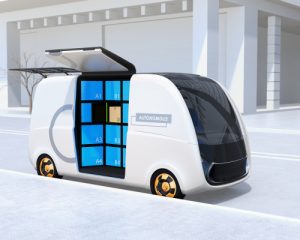
U.S. Reps. Cathy McMorris Rodgers (R-WA) and Bob Latta (R-OH) last week requested that the U.S. Department of Transportation (DOT) expeditiously complete planned regulations for autonomous delivery vehicles, which provide contactless deliveries.
“Once complete, these rulemakings will create twenty-first century vehicle standards that reflect the evolving nature of transportation and protect public safety,” Rep. McMorris Rodgers and Rep. Latta wrote in a July 16 letter sent to DOT Secretary Elaine Chao. “Updated standards will create certainty for all manufacturers that are innovating in autonomy and delivery.”
On the House Energy and Commerce Committee, Rep. McMorris Rodgers serves as the Republican Leader on the Consumer Protection and Commerce Subcommittee, while Rep. Latta is the Republican Leader of the Subcommittee on Communications and Technology. Specifically, the lawmakers requested that DOT and the National Highway Traffic Safety Administration (NHTSA) prioritize enactment of the regulations to make contactless delivery of medicine, food and other necessities more quickly available during the COVID-19 pandemic.
“Occupantless, autonomous vehicles are designed specifically for contactless last-mile delivery,” according to the congressmen’s letter. “Autonomous delivery pilot programs are already underway in several states, including delivering groceries and packages in senior citizen communities to allow our seniors to remain safely at home, COVID tests at clinics, and meals to temporary hospitals.”
During the current pandemic, “it is critical NHTSA prioritize this work” to help decrease the spread of disease by making it easier for customers to remain at home while receiving affordable deliveries.
Reps. Latta and McMorris Rodgers pointed out that the current Federal Motor Vehicle Safety Standards were not developed with occupantless vehicles in mind.
“While requirements such as seatbelts, windshields and airbags are prudent to protect the safety of passengers, they are unnecessary for a vehicle with no human occupants,” according to their letter.
Additionally, they wrote, these vehicles hold great promise to improve road safety, save time for Americans, reduce emissions and congestion, and create jobs.
The representatives also noted that if the federal government fails “to advance this technology here at home, we risk ceding global leadership to China.”



